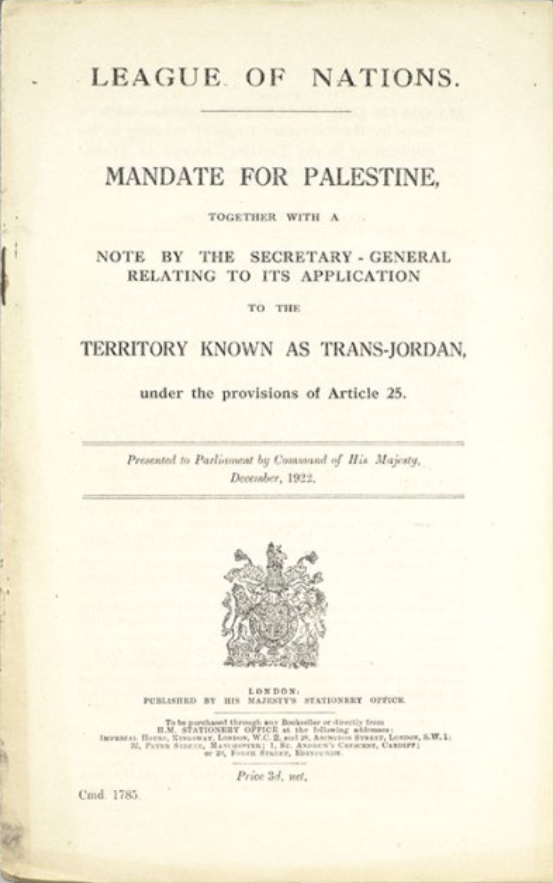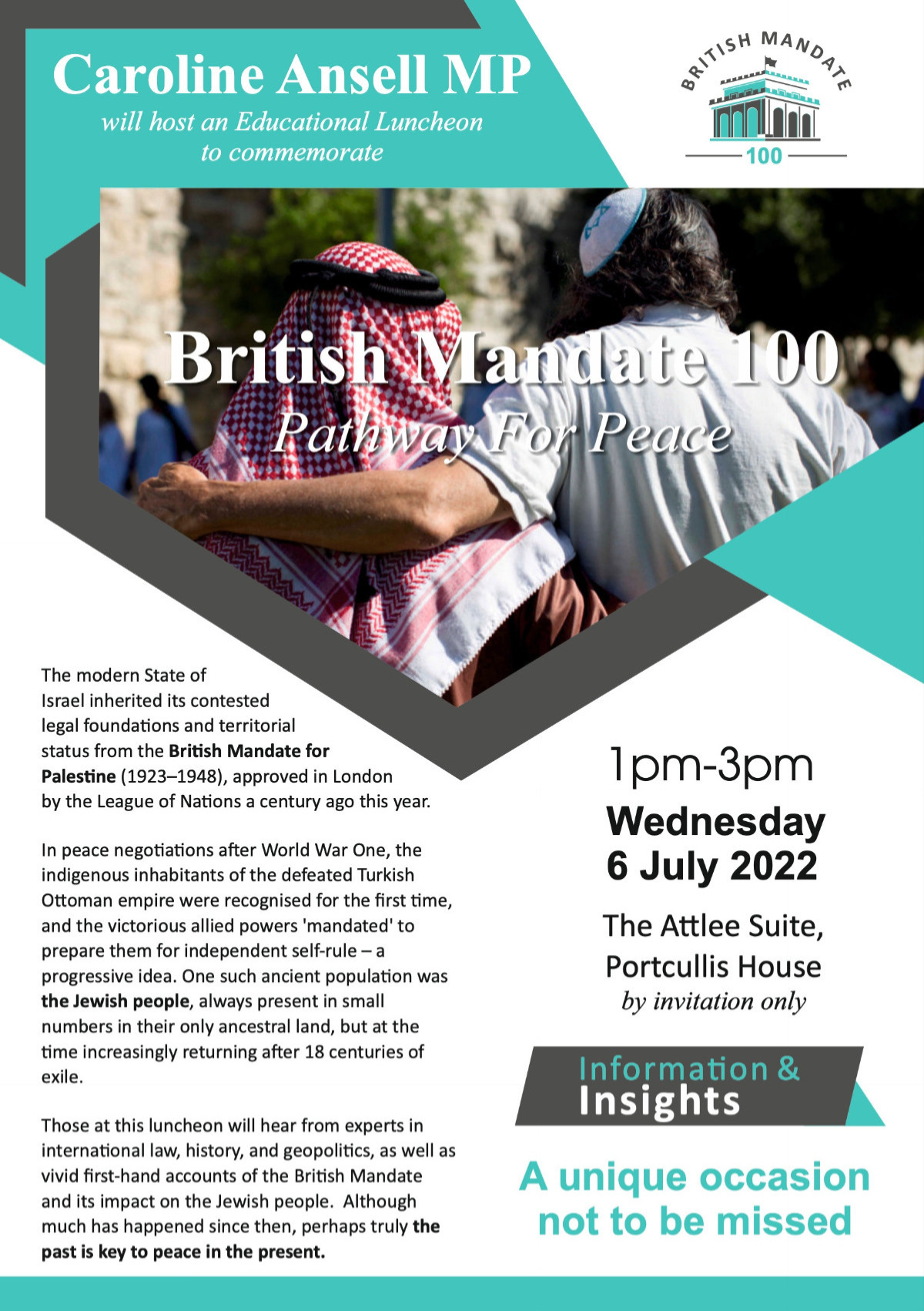the british mandate
July 1922
International approval of Britain's plans for a Jewish homeland "from the River to the Sea",
next to an Arab homeland in the neighbouring territory of Transjordan
What is a "mandate"? It is a key step in the transition from empires to postcolonial states. The imperial powers who won the First World War were no longer to annex their defeated rivals as colonies, but instead prepare the indigenous peoples of those territories for independence. The principle was established as "a sacred trust of civilisation" in Article 22 of the charter of the League of Nations, (which was founded during the Paris Peace Conference in 1919-20, and then absorbed into the new "United Nations" after the Second World War in 1946).
At San Remo, Palestine's mandate had been legally entrusted to Great Britain, who now had to propose detailed terms of the mandate for the League to approve.
A Two-State Solution
In March 1921, the Cairo Conference was convened by British officials, led by Winston Churchill as Colonial Secretary. Its aim was to resolve conflicting promises made to the Arabs in the private McMahon-Hussein Correspondence, to the Jews in the published Balfour Declaration, and to the French in the secret Sykes-Picot Agreement. Under the influence of T.E. Lawrence (of Arabia), it was decided to divide the territory of Palestine unequally but straightforwardly down the Jordan River.
The Arabs would therefore get their continuous Arab homeland across three neighbouring territories of Mesopotamia (Iraq), "Transjordan" (eastern Palestine), and the independent Kingdom of Hejaz (around Mecca in the northwest Arabian peninsula). All of these would be governed by the Hashemite dynasty, the royal family of Sharif Hussein of Mecca, with Britain overseeing the two northern mandates ruled by his sons. The Jews would receive their homeland but now in just the one-quarter of Palestine west of the Jordan River, and France would keep charge of Syria and Lebanon as agreed at San Remo.
Working it out
The terms of the Mandate for Palestine were designed to bring about the Jewish homeland, so Britain was required to facilitate Jewish immigration and close settlement, and the creation of a Jewish agency for self-government (Articles 2, 4, 6, 7, 11). Yet with eastern Palestine now becoming the Arab state of Transjordan, Article 25 of the Mandate for Palestine allowed Britain to exclude that territory from most terms of the Mandate. This became in effect the original "two-state solution" for Jews and Arabs in Palestine, one that stood the test of time.
One little-known fact is that two of the main figures in the original negotiations, Emir Faisal and Chaim Weizmann, already agreed that there was no reason why Jews and Arabs could not co-exist peacefully. Will we see statesmen of their calibre arise in our own time?

A Jewish Homeland
During a meeting in London in July 1922, the League of Nations formally and unanimously accepted the terms of the British Mandate for Palestine. Its preamble repeated the San Remo Resolution and thus also the Balfour Declaration, and noted that "...recognition has thereby been given to the historical connection of the Jewish people with Palestine and to the grounds for reconstituting their national home in that country".
The world leaders thus recognised the Jewish people as truly indigenous and deserving of a homeland in all the territory from the River to the Sea, one that would also protect minority communities. Even so, the conflict had sadly already begun, because most Arabs have never been willing to accept a Jewish return to self-rule in any of that land, as per Muslim doctrine.
The Mandate's failure
The noble words of the documents that led to the introduction of the British Mandate sadly failed to become a long-term reality. The Zionist inclination of the wartime British cabinet gave way to an "Arabist" civil administration in the 1920s. Mishandling of both Jewish and Arab populations, the blocking of Jewish settlement while allowing illegal Arab immigration and anti-Zionist policies from London led to a period of turmoil and bloodshed under British rule. Arabs were allowed to massacre Jews, with British soldiers turning a blind eye.
Subsequent to World War 2, Jewish resistance to both British discrimination and Arab terrorism led to a spiral of more violence. Eventually Britain gave up trying to fulfil its mission and returned the Mandate for Palestine to the successor body to the League of Nations, the United Nations.
On May 14th 1948, following a UN vote to partition Palestine into areas of Jewish and Arab settlement, the British flag was lowered for the last time and David Ben Gurion declared the founding of the modern Jewish state of Israel.
The centenary commemoration
Sadly, once again COVID restrictions prevented an "in person" event to commemorate the mandate. In its place a smaller event was held in parliament for peers, MPs and distinguished invited guests. Shortly before the actual centenary, the gathering was held in Portcullis House, opposite the Houses of Parliament on 6th July 2022.
After a buffet luncheon, the proceedings were opened by Philip Hollobone MP on behalf of Caroline Ansell MP who was the official host of the event. Lord Leslie Turnberg gave the first speech, addressing the history of why Britain was given the Mandate for Palestine and why Britain did not ultimately succeed. Retired Israeli colonel Shaya Harsit then addressed the personal and collective impact of the Mandate especially regarding its conclusion after WW2, which he experienced first-hand. In response, Matthew Offord MP offered a statement of solidarity with the Jewish people and respect for Holocaust survivors such as Shaya.
International lawyer Andrew Tucker addressed the relevance of the Mandate for the current conflict. Lord Ian Austin concluded the event with remarks on the false accusation of Israeli apartheid and the true benefits of British-Israeli trade.
